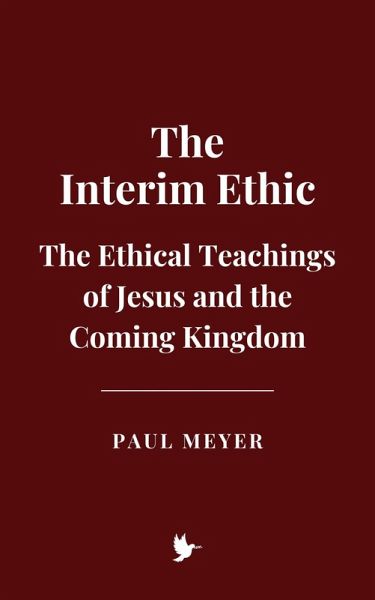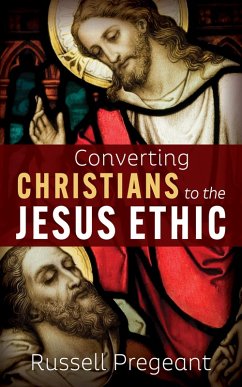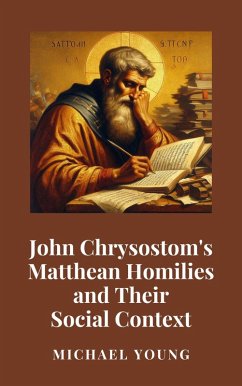
The "Interim Ethic": The Ethical Teachings of Jesus and the Coming Kingdom (eBook, ePUB)

PAYBACK Punkte
0 °P sammeln!
This work provides a comprehensive exploration of the ethical teachings of Jesus and their relationship to the proclamation of the Kingdom of God, analyzed through the lens of the "Interim Ethic" as articulated by Johannes Weiss and Albert Schweitzer. Positioned within the apocalyptic context of first-century Judaism, the study examines how Jesus' radical ethical imperatives-such as nonviolence, forgiveness, renunciation of wealth, and unconditional love-reflect an eschatological urgency tied to the imminent arrival of God's Kingdom. Drawing upon primary biblical texts, historical-critical met...
This work provides a comprehensive exploration of the ethical teachings of Jesus and their relationship to the proclamation of the Kingdom of God, analyzed through the lens of the "Interim Ethic" as articulated by Johannes Weiss and Albert Schweitzer. Positioned within the apocalyptic context of first-century Judaism, the study examines how Jesus' radical ethical imperatives-such as nonviolence, forgiveness, renunciation of wealth, and unconditional love-reflect an eschatological urgency tied to the imminent arrival of God's Kingdom. Drawing upon primary biblical texts, historical-critical methods, and key theological interpretations, the work delves into the historical foundations, conceptual frameworks, and subsequent developments of this ethical paradigm.
The study systematically engages with the contributions of Weiss, Schweitzer, and subsequent 20th-century scholars, including Rudolf Bultmann, C. H. Dodd, and E. P. Sanders, tracing the evolution of the Interim Ethic within the broader discourse on the historical Jesus and the early Christian community. It critically evaluates the theological implications of situating Jesus' teachings within an apocalyptic framework while also addressing the challenges posed by the delay of the eschaton and the adaptability of these teachings to the ongoing life of the Church.
Beyond the historical and theological analysis, the work investigates the universal and enduring dimensions of Jesus' ethical teachings. It explores how these principles have been reinterpreted and applied in diverse historical contexts, from early Christian communal practices to modern movements for social justice, nonviolence, and ecological responsibility. Through dialogue with liberation theology, contemporary ethical theory, and critiques of idealism, the study highlights the relevance of Jesus' teachings for addressing pressing global challenges in the modern era.
Ultimately, this work argues that the Interim Ethic serves as both a historically specific response to apocalyptic expectation and a transformative vision of ethical living that continues to inspire and challenge individuals and communities. By bridging historical scholarship and theological reflection, it offers a nuanced understanding of the ethical legacy of Jesus and its implications for contemporary faith, practice, and the pursuit of justice.
The study systematically engages with the contributions of Weiss, Schweitzer, and subsequent 20th-century scholars, including Rudolf Bultmann, C. H. Dodd, and E. P. Sanders, tracing the evolution of the Interim Ethic within the broader discourse on the historical Jesus and the early Christian community. It critically evaluates the theological implications of situating Jesus' teachings within an apocalyptic framework while also addressing the challenges posed by the delay of the eschaton and the adaptability of these teachings to the ongoing life of the Church.
Beyond the historical and theological analysis, the work investigates the universal and enduring dimensions of Jesus' ethical teachings. It explores how these principles have been reinterpreted and applied in diverse historical contexts, from early Christian communal practices to modern movements for social justice, nonviolence, and ecological responsibility. Through dialogue with liberation theology, contemporary ethical theory, and critiques of idealism, the study highlights the relevance of Jesus' teachings for addressing pressing global challenges in the modern era.
Ultimately, this work argues that the Interim Ethic serves as both a historically specific response to apocalyptic expectation and a transformative vision of ethical living that continues to inspire and challenge individuals and communities. By bridging historical scholarship and theological reflection, it offers a nuanced understanding of the ethical legacy of Jesus and its implications for contemporary faith, practice, and the pursuit of justice.
Dieser Download kann aus rechtlichen Gründen nur mit Rechnungsadresse in A, B, CY, CZ, D, DK, EW, E, FIN, F, GR, H, IRL, I, LT, L, LR, M, NL, PL, P, R, S, SLO, SK ausgeliefert werden.













